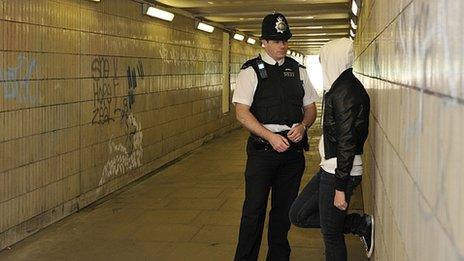Louise Casey: The Asbo tsar set to tackle extremism
- Published
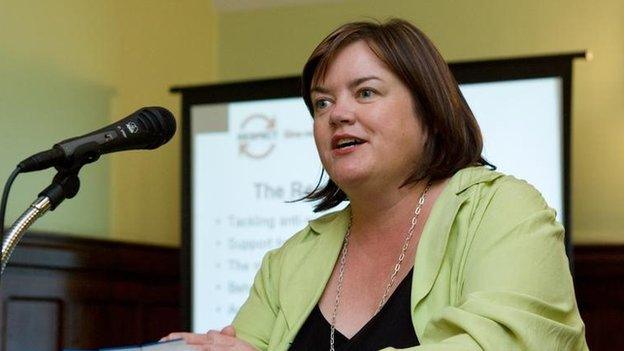
Louise Casey is to lead a review into improving the integration of Britain's minorities as part of a broader effort to tackle extremism. Why do prime ministers keep coming back to this most unorthodox of civil servants?
Call Casey - that's the cry that seems to go up in Downing Street whenever there is a hot button social issue to be tackled.
For nearly two decades now, she has blazed a trail through Whitehall, charming Labour and Conservative leaders alike with her blunt, no-nonsense approach to complex problems.
She is the social worker who doesn't sound like a social worker, the policy expert who doesn't send you to sleep.
As a result, she has collected more titles than a member of the Russian royal family.
She was Tony Blair's Anti-Social Behaviour tsar, and then his Respect tsar and then - as the Labour government gave way to the coalition - the first Independent Commissioner for Victims and Witnesses for England and Wales (or Victim's tsar).
She gave up that role to take charge of an inquiry into the 2011 London riots. Then, in September last year, she was appointed by former local government secretary Eric Pickles to head the independent inspection of children's services at Rotherham Council in the wake of the child sexual exploitation scandal and examine whether it covered up information about the abuse.
Since 2011, her main job has been director general of the government's "troubled families" unit.
She has her critics - she was once branded the "punitive face of Tony Blair" by probation officers' union boss Harry Fletcher, who took exception to her work on anti-social behaviour.
But politicians seem to value her because, in the words of former Labour Home Secretary Jacqui Smith in a 2010 Radio 4 profile, she can "really cut through the bureaucracy and Blarney" and get things done.
In a world of cautious, politically correct, hedge-betting civil servants, 50-year-old Casey has always stood out.
'Yob culture'
Casey was born in Cornwall and grew up in Portsmouth in a working class household - she and her brother were the first members of her family to go to university.
She studied history at Goldsmith's College, London, and threw herself into student activism, marching against student loans and becoming a member of Amnesty International.
Friends recall a big character, funny and charismatic, who loved making speeches and could not resist a karaoke night (Billie Holiday and The Beatles were favourites apparently).
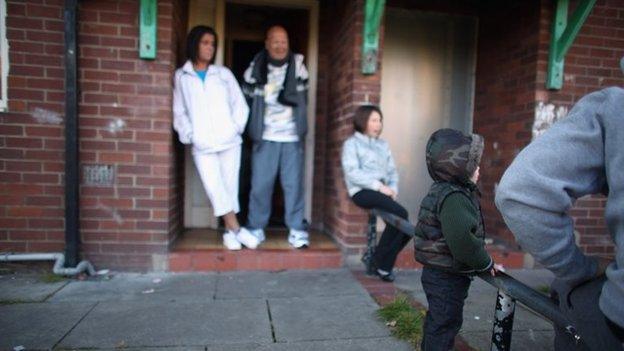
Casey has pioneered a new approach to social work
Her first job was as a benefits clerk for the DHSS but she soon moved into the charity sector, with the London Homeless Network. By 27, she was deputy director of homeless charity Shelter.
She was drafted into government in 1999 as the head of Labour's Rough Sleeper's Unit and ran into immediate controversy by suggesting that homeless charities were making it too easy for people to sleep on the streets by providing soup runs and top-of-the-range sleeping bags.
In 2002, Tony Blair made her head of the government's Anti-Social Behaviour Unit, with a brief to tackle "yob culture".
She almost came unstuck three years later when she was secretly recorded making an expletive laden speech to police officers and senior civil servants in which she appeared to mock her own department's stand on alcohol abuse.
"I suppose you can't binge drink any more because lots of people have said you can't do it. I don't know who bloody made that up; it's nonsense . . . Doing things sober is no way to get things done," she told her audience.
'Sleep with the devil'
She also took a swipe at one of the favourite Whitehall obsessions of the era: "If No 10 says bloody 'evidence-based policy' to me one more time, I'll deck them."
She came close to being sacked over that incident but was cleared by an internal civil service investigation. She became a little more guarded in her public statements after that but still managed to grab headlines on a regular basis.
"The Daily Mail don't like me 'cos I'm female and fat and lefty. Other people on the left think I sleep with the devil," she told The Guardian in 2013, external.
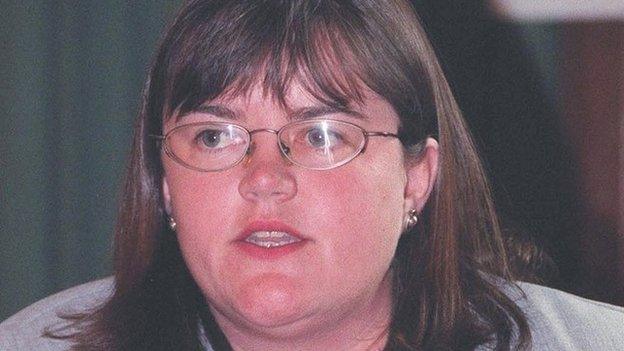
Casey came close to losing her job in 2005 after a gaffe
The problems Casey has been asked to tackle during her career are often hard to define and even harder to measure.
Is there less anti-social behaviour in Britain and more "respect" as a result of Casey's work?
Anti-Social Behaviour Orders were hugely controversial, with critics claiming they were too punitive and arbitrary. Casey claimed they transformed lives and they have survived, in modified form, to the present day.
The troubled families unit was meant to "turn around" the lives of 120,000 families by May this year.
'Shame and guilt'
"We are not running some cuddly social workers programme," Casey told The Daily Telegraph when the scheme was launched, external.
"We should be talking about things like shame and guilt...we have lost the ability to be judgmental because we worry about being seen as nasty to poor people."
The idea was to ditch the patchwork of different agencies in favour of a single, dedicated intervention worker, who would effectively take over the chaotic lives of those identified to be causing the most problems in their area. Casey ordered them to go where other social workers feared to tread.
"Some of these women are on child protection plans because of the men they insist on living with. Family intervention is about getting in there and saying 'actually, you know your kids are going to be taken away if you don't do something about this fella - I'll help you do it'. And they do," she told BBC News in 2013.
Local authorities were paid by results, such as getting a child back into school, reducing crime or a family member getting, and keeping, a job.
In November last year, Eric Pickles said that more than 69,000 families had turned around their lives according to this criteria and the government was well on the way to meeting its target - but some wondered whether the improvements to the families in the programme would last.
'Crack alley'
Perhaps Casey's real value to politicians - and the reason she keeps being asked to produce reports on difficult social problems - is that she say is able to say things in public that they think privately (that social workers are too "soft" for example).
She has the authority of someone who has got her hands dirty - she would go down a "crack alley" to find out why someone was taking drugs, a friend told a BBC Radio 4 profile - and the sort of drive to get the job done that is highly prized in the civil service.
But she also appears to have a handle on the emotional lives of those she is trying to help.
"They've got trouble in their souls, trouble in their heart, troubles in their head," she said of the young single mothers who were the focus of the troubled families unit, arguing that their problems stemmed from "not having enough love or of having too much pain".
Her latest role - to produce "a comprehensive review into boosting opportunity and integration to bring Britain together as one nation", which David Cameron hopes will lead to more people from ethnic and minority backgrounds feeling they have a stake in society - must be her toughest, most wide-ranging and politically sensitive challenge yet.
One thing is certain though - she won't sugarcoat her conclusions.
- Published20 July 2015

- Published3 July 2013
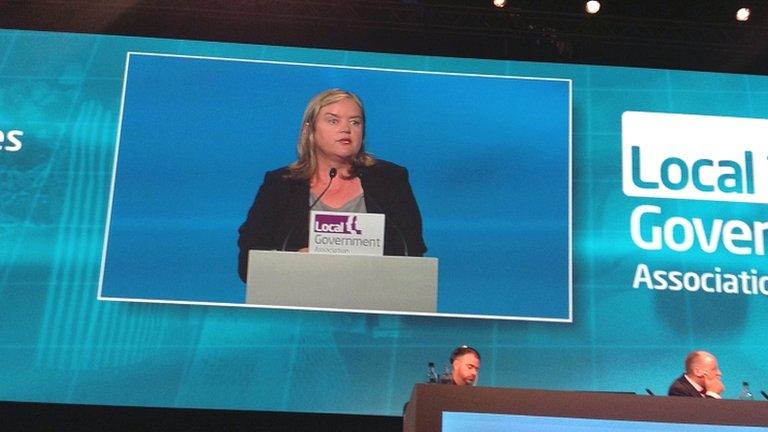
- Published18 July 2012
